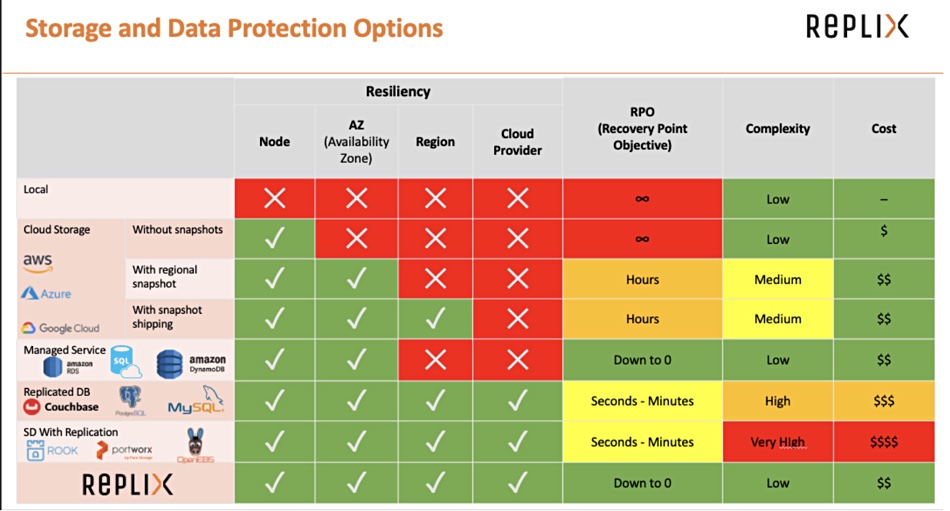This week, HPE announced it has sold a neat Qumulo system on its Apollo server for image processing, and Replix emerged from stealth as a containerised app data protector. We have also compiled the usual collection of news snippets from around the industry.
HPE and Qumulo store files for Rapid Image
Sweden-based Rapid Images replaces traditional 2D photo and film production with 3D-based technology. Its services are used by numerous industries to help companies market and sell their products and services online. It needs to look after a heap of unstructured data, a heap that has grown as the pandemic increased online shipping volumes – meaning more screen images.

Rapid IMages bought an HPE Apollo 4210 Gen 10 server with Qumulo Core scale-out file storage software. Rapid Images has developed an in-house Image Rendering Platform (IRP) running on this which requires instantaneous access to millions of files. It uses complex algorithms to translate and process artist’s instructions, and so produce thousands of images using clustered rendering.
Rapid Images says it now has a highly available, cost-effective file storage system for IRP, with real-time visibility of usage and performance.
Replix protects Kubernetes containers data
Replix, another startup protecting Kubernetes-orchestrated containers has emerged from stealth. The Israel-based company said the Replix Global Data Fabric protects and moves stateful containers between multiple public clouds. Competitors already doing this include MayaData, Pure’s Portworx, Robin, Trilio and Veeam’s Kasten.
We asked Replix what it had that was so special. A spokesperson told us: “While they are many solutions that protect Kubernetes data, Replix enables synced replicated data across AZ, Region and cloud provider. With Replix, sStateful applications can resume operations with the same flexibility and self-healing capabilities as stateless applications.”

“Replix is a fully managed service that does not require any installation, networking configuration or maintenance and is consumed as a service, without any upkeep establishment cost.”
With Replix you’re able to move your workloads between multiple Kubernetes clusters in different regions or clouds in just a few seconds, with all your stateful application retaining their data up to the last transaction.
Short shorts
ChaosSearch said 2020 was a record-breaking year, with the customer count tripling and revenue growing almost 8X.
Clumio has released a Splunk app to supply insight and visibility into Clumio audit logs. The utility is generally available and live on Splunkbase.
GigaSpaces, the in-memory-computing startup, this week said it doubled annual recurring revenues in 2020 and doubled the number of subscription customers for the second year in a row.
Infinidat, the enterprise storage array maker, experienced “a surging uptick in growth of half an exabyte in the fourth quarter of 2020”. The company report 7EB of data is stored in its arrays. compared with 6EB recorded in February 2020. The company claims its total storage deployed is higher capacity than the top eight primary storage all-flash array (AFA) vendors shipped in 2020. Infinidat anticipates customer demand for petabyte-scale systems is expected to accelerate its growth in storage deployments.
Nvidia violates the Transaction Processing Performance Council’s Fair Use Policy. The council announced that, in the paper “State of RAPIDS: Bridging the GPU Data Science Ecosystem,” presented at Nvidia’s GPU Technology Conference (GTC) 2020, and in associated company blogs and marketing materials, Nvidia claims that it has “outperformed by nearly 20x the record for running the standard big data analytics benchmark, known as TPCx-BB.” Since Nvidia has not published official TPC results, and instead compared results from derived workloads to official TPC results, the comparisons are invalid. The council is working with NVIDIA to resolve the issue and make all relevant corrections.
Rubrik’s largest MSP customer, Assured Data Protection, has launched ProtectView, a centralised platform that enables businesses to run their entire Rubrik estate via a single management user interface.
Scale Computing said it hit record revenues in 2020 with revenues growing 45 per cent in 2020. HCI and edge systems startup said it is now profitable.
Digital business initiatives are fuelling an increased emphasis on creating, storing, and using data, leading to increased adoption of all-flash object storage. That’s the findings of market research conducted by ESG on behalf of Scality. According to the report, all-flash object storage is early in the adoption phase but will become pervasive. Although 95 per cent of respondents use flash in object environments, only 23 per cent use an all-flash storage system today. Eighty-seven per cent of respondents not currently using all-flash object storage expect they will evaluate the technology in the next 12 months.
StorONE claims its vRAID 2.0 rebuilds failed drives faster than anything else. A 1PB StorONE system using 14TB drives can complete rebuilds in less than two hours. Competing technology takes days to achieve a similar rebuild, StoreONE says. The company has verified its claims using Seagate’s Application Platform 5U84 server with 14 flash drives and 70 x 14TB hard disk drives. It rebuilt failed SSDs in under four minutes and says most vendors report eight-plus hours of rebuild times for flash volumes.








